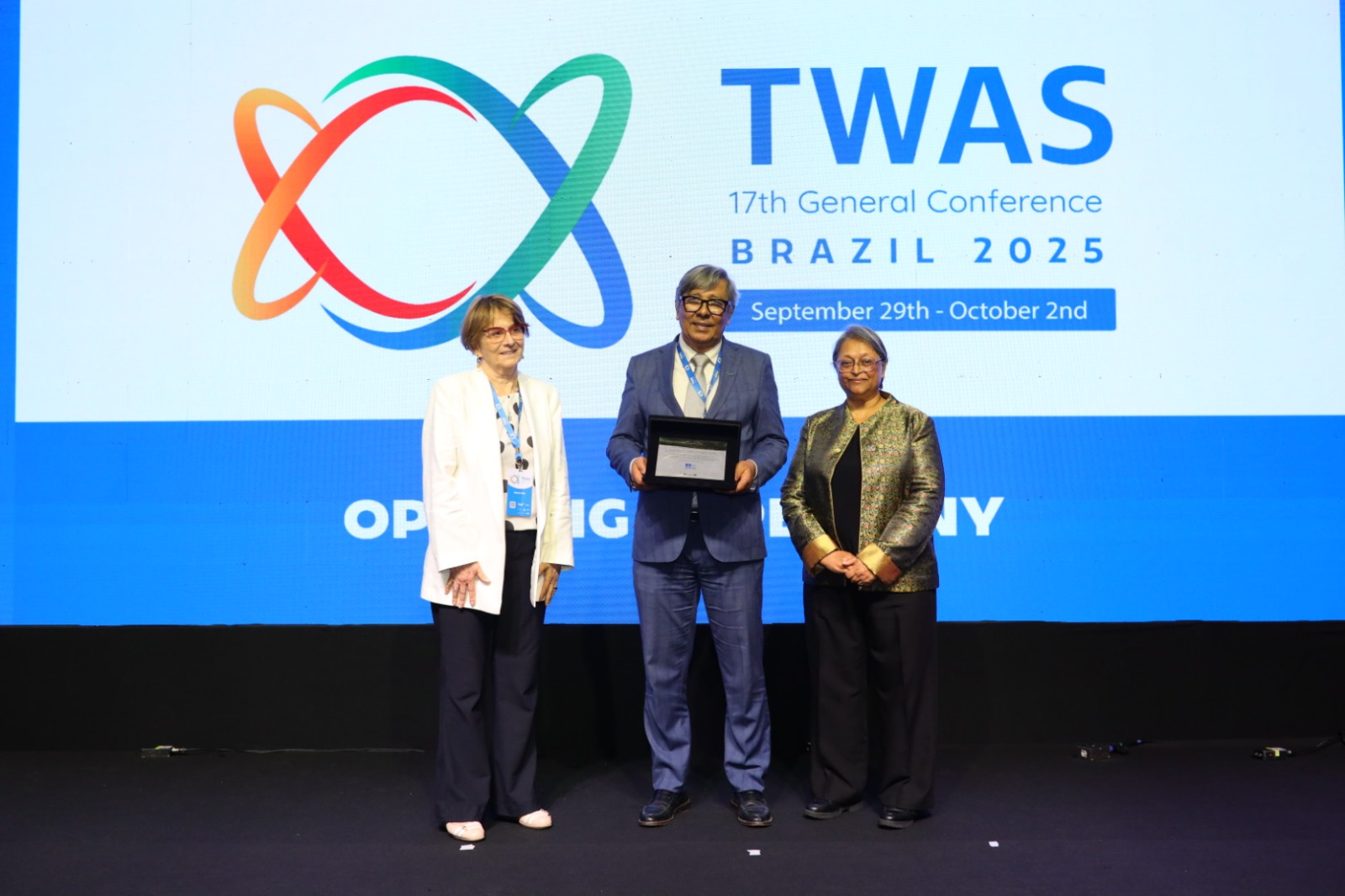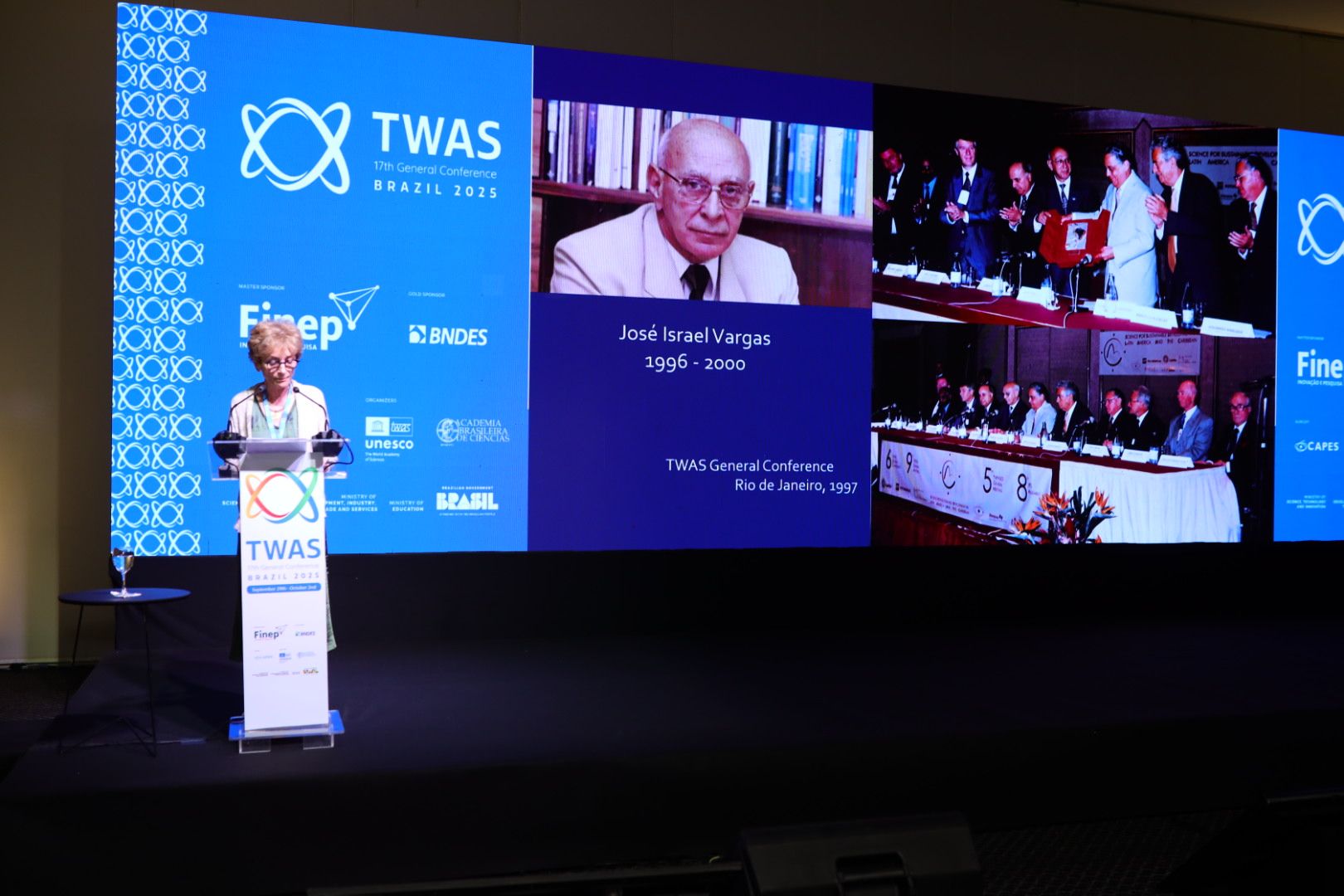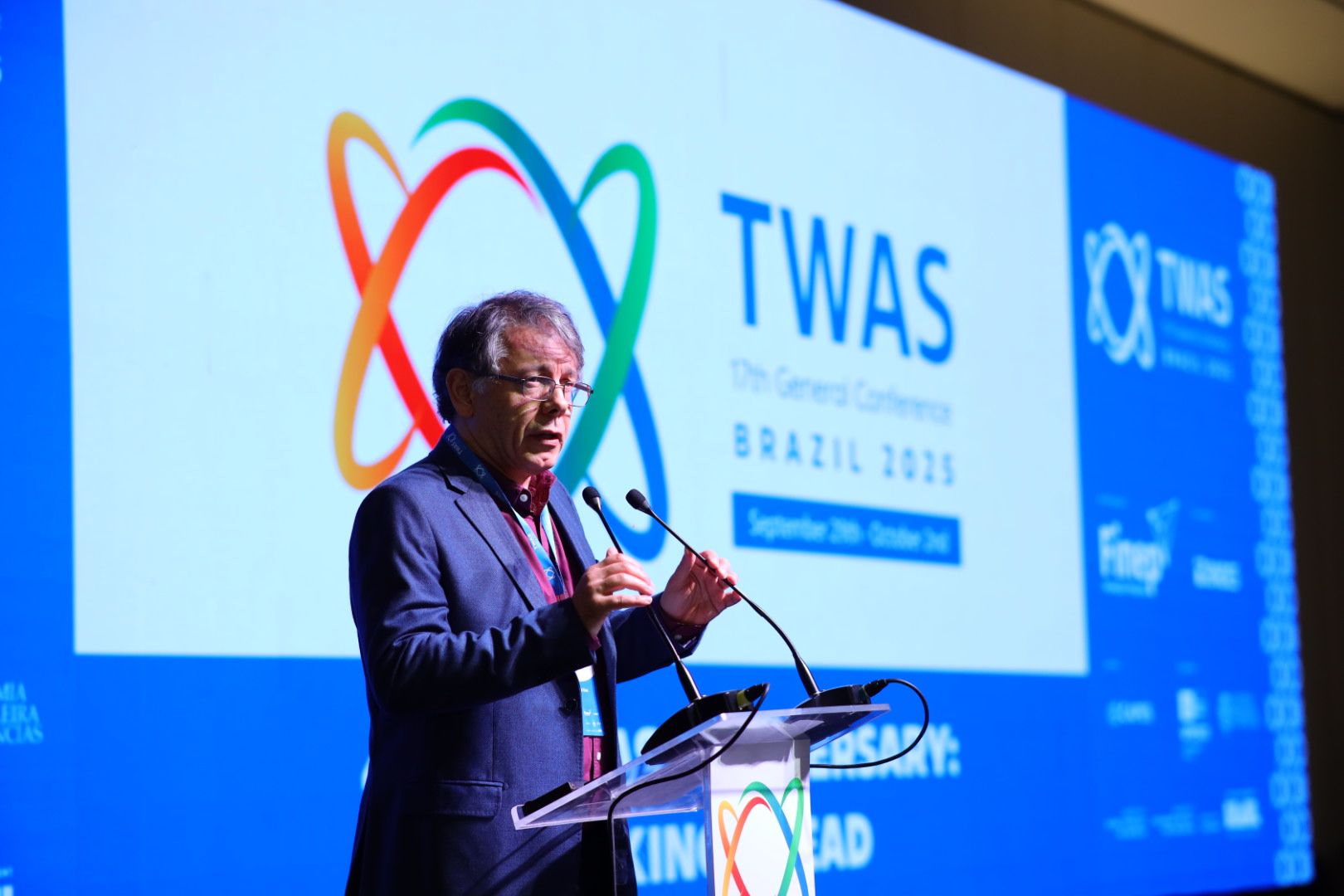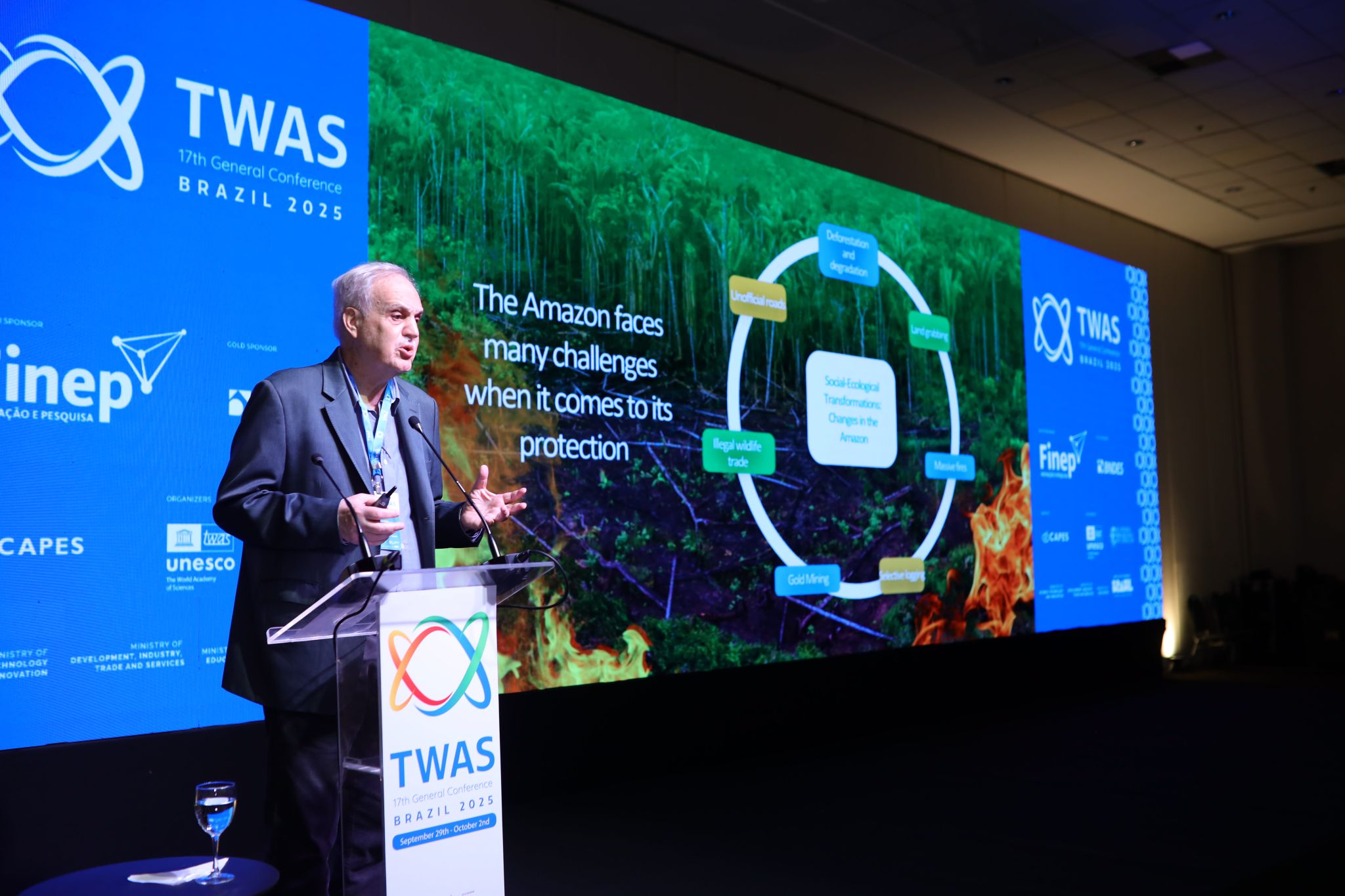Brazil has been a growing economic force that has shown resilience, according to agencies such as the World Bank. But an unignorable element of this resilient growth is a commitment to science, particularly collaborative science in the developing world—a commitment that is demonstrated through a strong relationship with TWAS since the Academy was still young.
This year, the 17th TWAS General Conference is happening in Rio de Janeiro, Brazil—the third edition of the Academy’s flagship event hosted by Brazil. Happening this week, the event focuses on how science, technology, and innovation can be leveraged to advance sustainable development globally, and organizes presentations and panels featuring some of the most high-level scientific experts from throughout the global South. The Conference is organized in partnership by the Brazilian Academy of Sciences (BAS) and TWAS. BAS also hosts the TWAS Regional Partner for Latin America and the Caribbean.

This year, the event is also a signal of the Academy’s close relationship with Brazil, a country that has been a steady ally of TWAS and through it an important supporter to scientific growth in the developing world.
“It is particularly significant that this General Conference is taking place in Brazil, a nation that has recently hosted the S20 and the BRICS summit, reaffirming its strong commitment to multilateralism, to scientific collaboration, and to building bridges between countries of the global South and the world at large,” said Helena Nader, the president of BAS and vice-president of TWAS for Latin America and the Caribbean.
“Brazil is one of the top producers of scientific knowledge in the global south,” Francilene Garcia, president of the Brazilian Society for the Advancement of Science (SBPC) at the opening ceremony of the Conference on 29 September. She cited the country’s role in science tied to the Amazon rain forest, public health and vaccines, as well as “balancing renewable energy and digital technology, and also artificial intelligence for the public good.”
“It’s inspiring here to see three women presidents of TWAS, BAS, and also SBPC,” she added, referring to TWAS President Quarraisha Abdool Karim, BAS president Helena Nader, and herself.
During the same ceremony, Denise Pires de Carvalho, President, Coordination for the Improvement of Higher Education Personnel (Capes), Brazil, highlighted the importance of scholarships for both basic studies and higher education. “Research universities and institutes of science and technology have great, important work to do related to increasing the number of doctorates in our country, which can help socioeconomic development.”
Brazilians in TWAS leadership
Two of TWAS’s seven presidents have been from Brazil. The first, José Israel Vargas, directly succeeded TWAS Founder Abdus Salam and served from 1996 to 2000, holding the presidency simultaneously with his role as minister of science and technology in the Brazilian government of President Fernando Henrique Cardoso. Both Cardoso, a sociologist, and Vargas, a chemist, were TWAS Fellows, and Cardoso used to fondly refer to TWAS as “my academy”.

During his tenure, Vargas worked to enhance the Academy’s visibility and influence in Latin America—which had already established a strong role in Asia and Africa—and mobilized governmental support for the newly launched TWAS Endowment Fund, which serves as the bedrock for TWAS’s current financial stability. He also contributed to and witnessed the signing of the historic agreement between UNESCO and the Italian government to provide permanent funding to TWAS through UNESCO.
From 2007 to 2012, another Brazilian would serve as TWAS President: Jacob Palis. Palis was a mathematician with an enormous impact, and has previously served on TWAS committees as early as 1991 and was the Academy’s secretary-general from 2001–2006.
This deep involvement in TWAS was reflected in Palis’s presidency, as he worked hard to expand the Academy’s South-South postgraduate fellowships, and they reached nearly 300 fellowships annually. Palis also empowered TWAS Regional Partners to take charge of fostering young scientific talent, and since then they have regularly hosted regional conferences for young scientists, and selected TWAS Young Affiliates.

More recently, TWAS welcomed its first Brazilian executive director in its history, Marcelo Knobel. He is a physicist and long-time leadership figure in Brazilian science and the 12th rector of the University of Campinas (Unicamp), in Brazil. He is also dedicated to science communication, having founded Unicamp’s Science Exploratory Museum and conducted research on the public perception of science and higher education.
Among Knobel’s accomplishments was guiding TWAS as it joined forces with the Conrado Wessel Foundation (FCW) of Brazil to launch a pioneering international science photography award called Through Southern Lenses: Science in Focus. This initiative aims to celebrate scientific excellence in the developing world through the lens of photography, and will spotlight scientific achievements and human stories emerging from developing countries using photography as a dynamic tool for science communication.
Third Conference in Brazil
The first TWAS’s flagship events in Brazil was also in Rio, in 1997, under the presidency of Vargas and with the backing of Cardoso. This was also the first time the event was held in Latin America, and served to raise the Academy’s profile there while also laying the groundwork for future Conferences across the region.
At the time, the event was called the 10th TWAS General Meeting, and they were referred to interchangeably as the Conference or Meeting for much of the Academy’s history until it was formalized as the Conference in 2021, and now the Meeting is a closed-door session held during the more-open greater Conference between TWAS Fellows and officials, in which decisions are made about the direction of the Academy.
The second time the event was held in Brazil was 2006 in Angra dos Reis, Brazil. Called the 10th TWAS General Conference, it demonstrated the solidifying TWAS-Brazil relationship and was sponsored by the Brazilian Ministry of Science and Technology through its agencies, the National Council for Scientific and Technological Development (CNPq) and the Brazilian Innovation Agency (Financiadora de Estudos e Projetos, FINEP), as well as the Brazilian Academy of Sciences. Palis was also elected president of TWAS at this Conference.
The event also hosted the first-ever TWAS Regional Conference for Young Scientists (RCYS). It also was the site of an agreement to create the Consortium on Science, Technology and Innovation for the South (COSTIS), a mechanism for devising strategies and implementing programmes for building Science, Technology and Innovation capacity, was also reached during the event. Furthermore, 18 ministers of science and technology and high-level science administrators met at the event’s Third World Network of Scientific Organizations (TWNSO) 9th General Assembly.

This year's Conference builds on the successes of these previous events, with not only its usual awards ceremony and opening and closing events, but an event celebrating TWAS’s 40th anniversary; symposia artificial intelligence in the global South, climate change and food security, and the global South’s health challenges; a networking session for TWAS Young Affiliates; and more.
Brazil and TWAS fellowships
The ongoing partnership between TWAS and Brazil is perhaps best demonstrated by its results in training developing world scientists. And the pillar of this is a major programme with the National Council for Scientific and Technological Development (CNPq) called the TWAS-CNPq fellowships.
These fellowships offer scientists from developing countries other than Brazil the opportunity to travel to Brazil and receive PhD or postdoctoral training. Since the programme began in 2004, these opportunities have so far been offered to 418 PhD students and 148 postdoctoral researchers, and the programme continues to this day.
Such fellowships are central to TWAS’s mission, because with each new PhD scientist, developing countries build a foundation for scientific strength. In its current form, the TWAS-CNPq fellowships provide up to 50 PhD opportunities to developing world scientists every two years under a recently signed agreement with the government of Brazil. And historically, such scientists have received training in a wide variety of fields.
“I hope that this remarkable initiative will continue for many years to come,” said Ricardo Magnus Osorio Galvão, President of National Council for Scientific and Technological Development (CNPq), Brazil, at the Conference.
Here are a few examples of TWAS-CNPq fellowship recipients:
- Pakistani biotechnologist Almas Taj Awan undertook her TWAS-CNPq fellowship in 2014 at the University of Campinas in Brazil to explore turning orange waste into a source of bioethanol.
- Nepalese biologist Deena Shrestha used experience during her PhD period from 2009-2104 as a launching point for her efforts to establish a unique research centre focused on human health and disease in Nepal, with cutting-edge biomedical facilities.
- Iraqi theoretical physicist Fouad Majeed used a one-year postdoctoral fellowship in 2019 to study nuclear reactions at the Federal University of Rio de Janeiro.
- Mozambican electrochemist Afonso Filipe João earned a PhD in electroanalytical chemistry in 2021 at the Federal University of Uberlandia through the fellowship. Soon afterward, he spent six further months at UFU with a postdoctoral position, and he is now head of the Research, Editing, and Publication department at Púnguè University in Mozambique.
Sean Treacy

